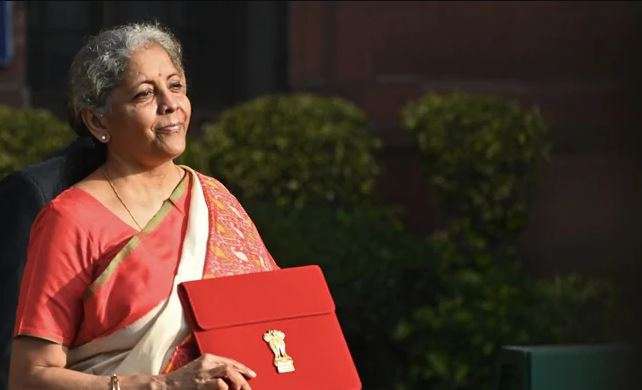Latest News
- 64 Cars Seized And 29,604 Traffic Citations Issued
- Increased Summer Electricity Demand Forecast In Kuwait
- Ethiopia And Kuwait Plan To Discuss Domestic Workers
- Syrian Expat Threatened By Fake Police
- PAM To Provides Shelter For Male Expat Workers
- Unemployed Kuwaitis Keep On Increasing Annually
- Fight Between Two Expats Leads To Stabbing At A Gas Station
- Kuwait Has One Of The Lowest Infection Rates In Its Health Facil...
- 70 Abandoned Vehicles Were Removed In Farwaniya
- Passengers' Dispute Leads To Delay And Legal Action On A Kuwait...
- Sahel App Launches Electronic Ration Card Renewal
- Education Officials Ban Filming And Publishing Student Content
India Budget 2021: India To Allow Nris To Set One-man Companies

Finance Minister Nirmala Sitharaman on Monday said NRIs will be allowed to set up one person companies, definition of small companies will be revised and various provisions of the Limited Liability Partnership (LLP) Act will be decriminalised. The proposed relaxations to rules governing One Person Companies (OPCs) are expected to benefit startups and innovators
One person company (OPC) means a company formed with only one (single) person as a member, unlike the traditional manner of having at least two members to form a company.
OPCs will be allowed to "grow without any restrictions on paid up capital and turnover, allowing their conversion into any other type of company at any time, reducing the residency limit for an Indian citizen to set up an OPC from 182 days to 120 days and also allow Non Resident Indians (NRIs) to incorporate OPCs in India". OPCs, which have lesser compliance requirements, can be set up with one member.
Finance Minister Nirmala Sitharaman also proposed the removal of double taxation for Non-Resident Indians (NRIs) on income accrued through foreign retirement benefits accounts, the minister announced in the Union Budget session on Monday. Nirmala said the tax department will notify rules to remove hardships of double taxation faced by NRIs in certain classes.
“When Non-Resident Indians return to India, they have issues with respect to their accrued incomes in their foreign retirement accounts. This is usually due to a mismatch in taxation periods. They also face difficulties in getting credit for Indian taxes in foreign jurisdictions. I propose to notify rules for removing their hardship of double taxation,” she said.
Double taxation refers to a situation in which NRIs are taxed on the same income twice, both in India and the country of residence. While NRIs are not taxed on global income in India, they are taxed on income earned or accrued within India. This can be salary earned in India, income on fixed deposits or savings accounts, income on housing property located within India, among others. Currently, double taxation can be avoided by seeking relief through The Double Tax Avoidance Agreement (DTAA).
SOURCE : IIK
Trending News
-
 Ministry Announces Separate Time For Amnesty Seeke...
21 April 2024
Ministry Announces Separate Time For Amnesty Seeke...
21 April 2024 -
 The Ministry Connects With Violators Of Residency...
23 April 2024
The Ministry Connects With Violators Of Residency...
23 April 2024 -
 AstraZeneca Admits Covid Vaccine Can Cause Rare Si...
29 April 2024
AstraZeneca Admits Covid Vaccine Can Cause Rare Si...
29 April 2024 -
 Work Permits Will Be Issued For One Year Under The...
27 April 2024
Work Permits Will Be Issued For One Year Under The...
27 April 2024 -
 3 Expats Caught In Salmiya With 213 Bottles Of Loc...
23 April 2024
3 Expats Caught In Salmiya With 213 Bottles Of Loc...
23 April 2024 -
 Temperature Increases Cause Electricity Load Index...
21 April 2024
Temperature Increases Cause Electricity Load Index...
21 April 2024 -
 Al-Nuer Festival Celebrates Kuwaiti Agriculture Wi...
22 April 2024
Al-Nuer Festival Celebrates Kuwaiti Agriculture Wi...
22 April 2024 -
 Peak-time 'cut-offs' Raise Fears Of An Electricity...
22 April 2024
Peak-time 'cut-offs' Raise Fears Of An Electricity...
22 April 2024 -
 Gulf Electrical Interconnection Project Will Boost...
04 May 2024
Gulf Electrical Interconnection Project Will Boost...
04 May 2024 -
 Road Trip From Kuwait To Bahrain Via Saudi: Travel...
22 April 2024
Road Trip From Kuwait To Bahrain Via Saudi: Travel...
22 April 2024











Comments Post Comment